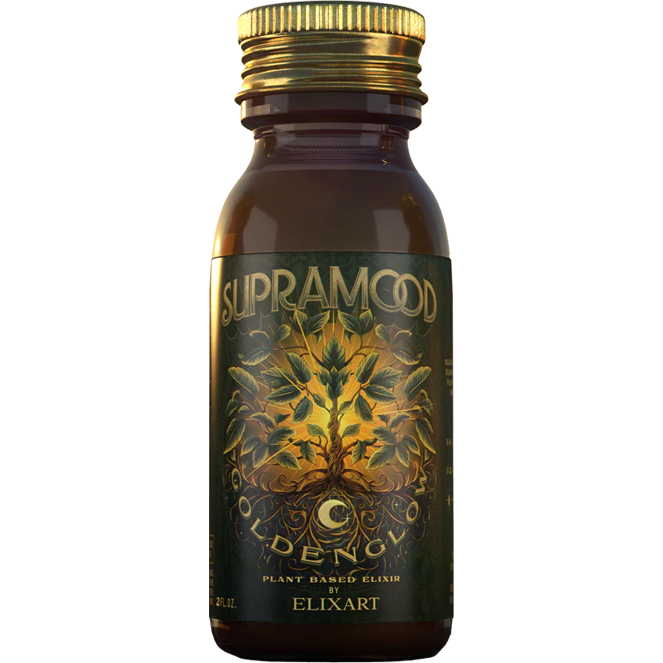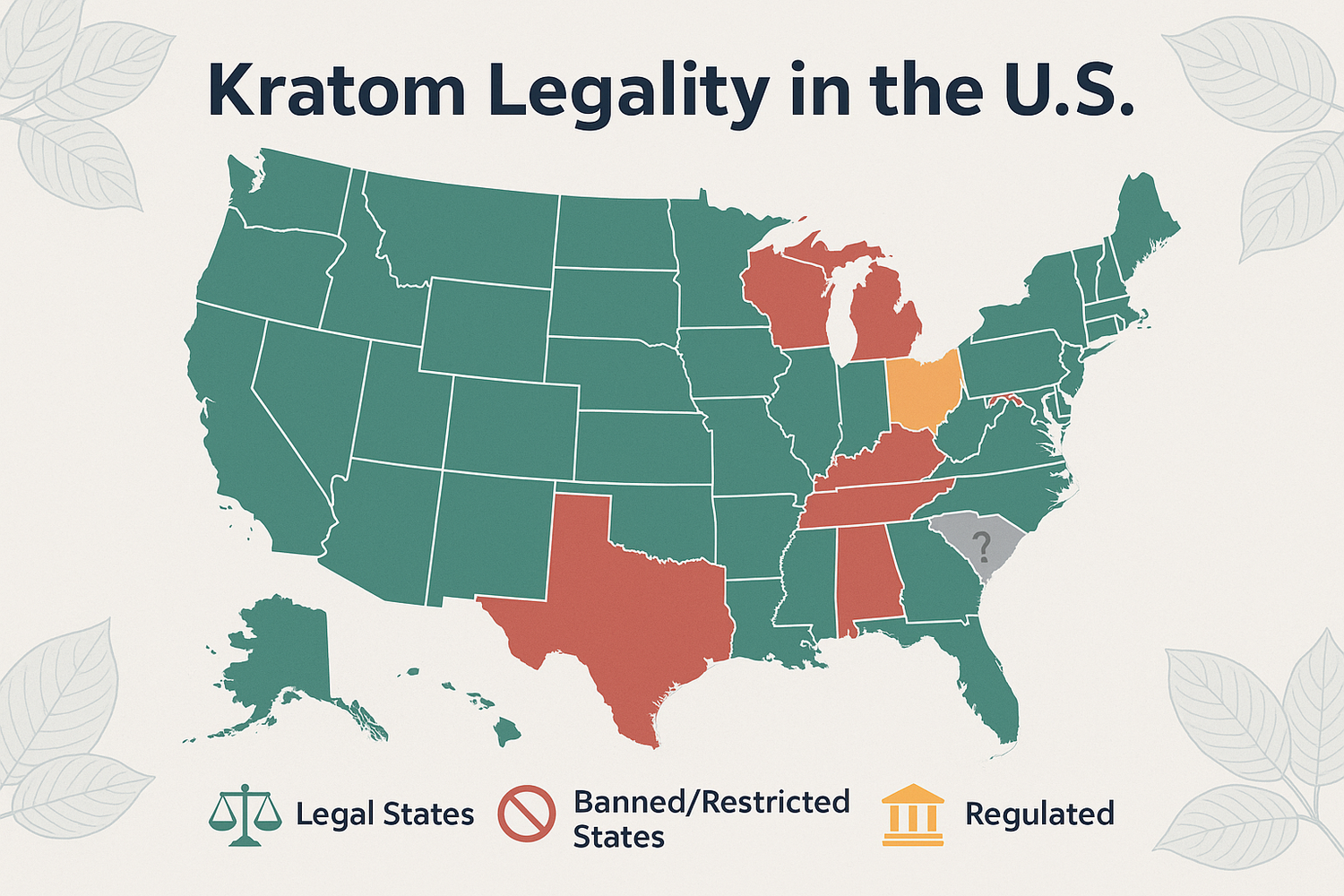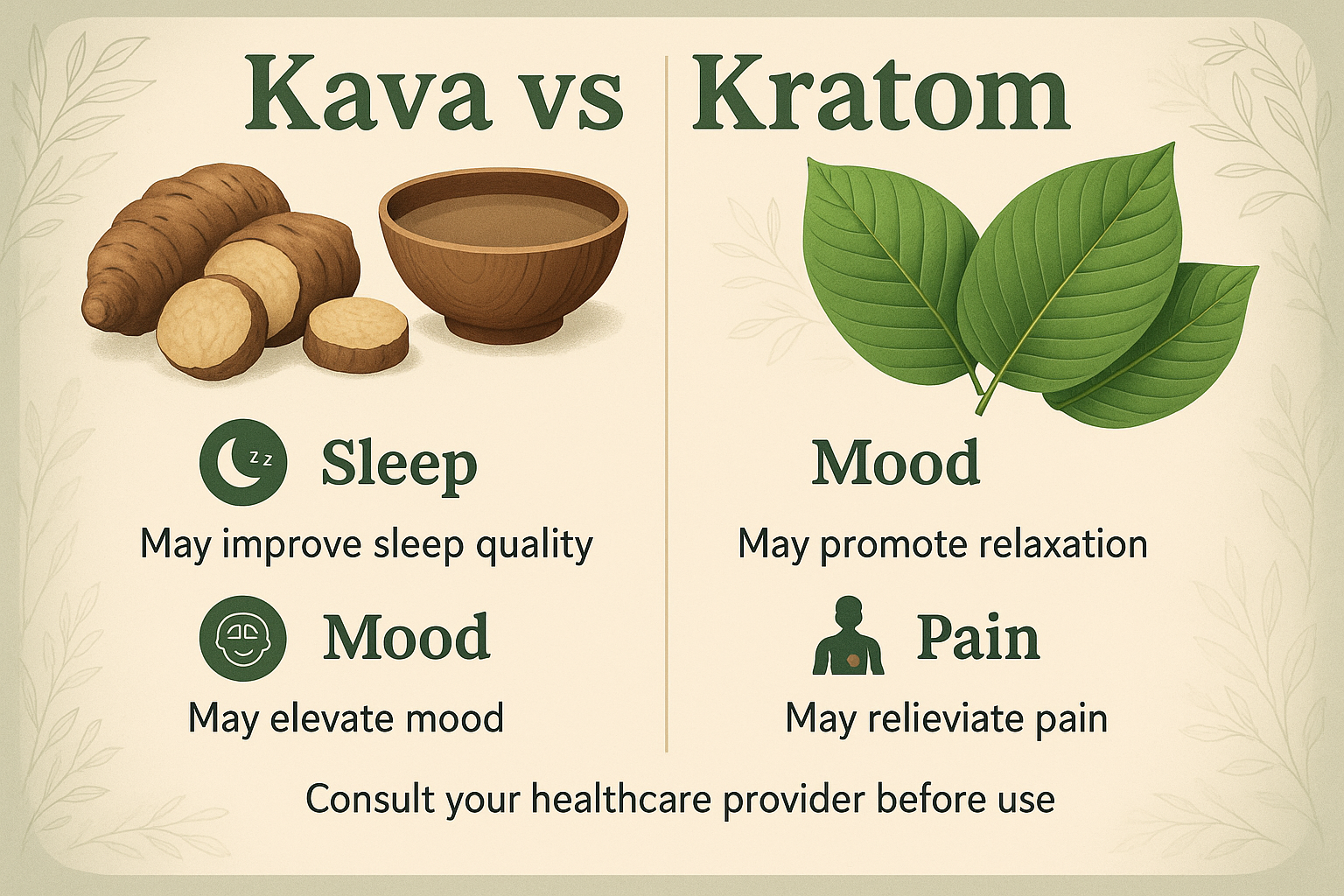Table of Contents
- Introduction to Kratom Legality in the U.S.
- Is Kratom Legal in the U.S.?
- State-by-State Kratom Legality
- Kratom and Federal Agencies
- Special Cases & Restrictions
- Conclusion
- FAQs
Introduction to Kratom Legality in the U.S.
Let’s be honest, when a plant gets people talking in Congress, the media, and wellness circles, you know it’s worth digging into. If you have ever walked into a smoke shop or health store and seen “kratom” on the shelf, then wondered, “Is kratom legal?” You’re not alone. This seemingly harmless botanical has become the center of a nationwide legal debate.
Kratom, a tropical tree native to Southeast Asia, has gained attention in the U.S. for its stimulant and opioid-like effects. People use it for energy, pain relief, and sometimes to manage withdrawal symptoms from other drugs. But here’s where things get murky: kratom is legal in some states, banned in others, and sits in a regulatory gray area federally.
In this blog, we’ll break down the complex legal landscape of kratom in the United States, uncover why it’s legal in many places, which states have outlawed it, and what the future might hold.
Key Takeaways
- Kratom’s legality in the U.S. is complicated and varies widely by location.
- While not banned at the federal level, kratom is not FDA-approved.
- Some states and cities have imposed bans due to health and safety concerns.
- Advocacy groups like the American Kratom Association (AKA) play a major role in keeping kratom legal.
- Understanding kratom laws by state is essential for safe and legal use.
1. Is Kratom Legal in the U.S.?
At the federal level, kratom is legal nationwide, but state-by-state regulations complicate matters. While some cities and states have outright prohibited it, others permit it without restrictions. Read our complete blog for a detailed, state-by-state analysis and legal insights if you're wondering which states allow kratom and which don't.
1.1 Why Is Kratom Legal?
Kratom is currently legal in many parts of the U.S. because of several interconnected factors, chief among them a lack of definitive scientific evidence about its harm and the determined efforts of consumer advocacy groups. The American Kratom Association (AKA) has played a critical role in influencing lawmakers and the public to consider regulation over prohibition. They argue that kratom, when used responsibly, is a natural alternative to potentially dangerous pharmaceutical opioids.
Moreover, many states prefer to implement consumer protection laws rather than enforce outright bans. In states where kratom remains legal, lawmakers have either found insufficient cause for banning it or are waiting for more conclusive scientific studies. This middle-ground approach supports education and regulation instead of criminalization.
For users interested in how different kratom strains may support mood and relaxation within a legal framework, “Kratom and the Best Types for Mood & Relaxation” offers a helpful breakdown of which vein colors (e.g., Green Malay, White Borneo, Red Bali) are commonly favored for soothing effects and uplifting mood.”
1.2 Is Kratom Legal Federally?

As of now, kratom is not classified as a controlled substance under the federal Controlled Substances Act. This means that, at the federal level, it is technically legal to possess, use, and sell kratom in most states. However, that doesn't mean it’s risk-free.
The Food and Drug Authority (FDA) has issued multiple public health warnings about kratom’s potential for abuse and contamination. In 2016, the DEA proposed placing kratom’s primary alkaloids (mitragynine and 7-hydroxymitragynine) in Schedule I, which would have made it illegal nationwide. But a massive backlash from the public, scientists, and policymakers led the DEA to withdraw its intent.
So, while kratom is not banned federally, it remains under scrutiny. Its legality could shift if federal agencies move forward with stricter regulation or if Congress intervenes.
1.3 Will Kratom Be Banned in the U.S.?
There’s ongoing speculation about whether kratom will eventually be banned nationwide. While there's no immediate sign of a federal ban, the FDA continues to lobby against kratom, and certain politicians have proposed bills to restrict or regulate it more heavily.
That said, kratom advocates, including scientists, lawmakers, and citizens, continue to push back. The American Kratom Association’s Kratom Consumer Protection Act (KCPA) is now being considered or adopted in various states. This law sets safety and labeling standards without criminalizing kratom use, providing a legal framework to preserve public access while ensuring product safety.
The future of kratom may not lie in a complete ban, but rather in responsible regulation, akin to how cannabis or CBD is handled in various jurisdictions.
2. State-by-State Kratom Legality
The legal status of kratom varies by state in the United States; it is legal in some, prohibited in others, and subject to local restrictions in others.

2.1 Is Kratom Legal in California?
Yes, kratom is legal in the state of California, with one major exception: San Diego.
California does not have a statewide ban on kratom. This means that you can purchase, possess, and consume it freely, unless you're in San Diego, which passed a local ordinance in 2016 to ban the sale and use of kratom within city limits. The city cited public health concerns and potential misuse as the reason for the ban.
Outside of San Diego, you can legally buy kratom in cities like Los Angeles, San Francisco, and Sacramento, though local laws can always evolve.
2.2 Is Kratom Legal in LA?
Yes, Los Angeles permits the use and sale of kratom. You’ll find kratom in headshops, herbal stores, and even cafes promoting natural remedies. As of now, there are no city-level restrictions in Los Angeles.
That said, users should remain aware of emerging conversations about regulation. Like many large cities, Los Angeles is monitoring trends in kratom use and public health outcomes, which could affect future legislation.
2.3 What States Banned Kratom?

The legality of kratom is largely determined at the state level. So, what states banned kratom?
As of mid-2025, the following states have completely banned kratom:
- Alabama
- Arkansas
- Indiana
- Rhode Island
- Vermont
- Wisconsin
In these states, kratom is treated as a Schedule I controlled substance, meaning possession, sale, or use is illegal and punishable under law. Furthermore, some counties and municipalities in otherwise legal states have enacted local bans, such as Oceanside, CA, and Sarasota County, FL.
Several other states, like Oregon, Tennessee, and Colorado, are considering consumer protection bills that would regulate, but not prohibit, kratom.
2.4 Is Kratom Banned in Texas?
Texas currently allows kratom, and it's available for purchase at many health stores and specialty shops across the state. However, the conversation around kratom regulation has begun in legislative circles.
Lawmakers have discussed introducing bills that would regulate kratom products for purity, packaging, and age restrictions. While there’s no active ban in place, consumers in Texas should keep an eye on these developments, as future policies could change kratom’s availability or usage parameters.
3. Kratom and Federal Agencies
Kratom is not prohibited by law, it is still being investigated and has not received FDA approval. Despite growing public support, safety concerns have been voiced by agencies such as the FDA and DEA, which advise caution.
3.1 Is Kratom FDA-Approved?
Absolutely not. The FDA has not approved kratom for any medical use in the United States.
In fact, the FDA has been a strong critic of kratom for years. The agency argues that kratom has opioid-like properties, poses a risk for abuse, and can lead to adverse health outcomes, including seizures, liver damage, and even death, especially when contaminated or mixed with other substances.
They’ve also warned companies against making medical claims about kratom and have seized products that violate labeling or marketing rules. Despite this, the FDA hasn’t been able to completely restrict kratom sales due to its legal ambiguity at the federal level.
4. Special Cases & Restrictions
In addition to state regulations, kratom has particular restrictions in certain contexts, such as prohibitions for commercial drivers (CDLs), Olympic athletes, and in places like San Diego. Even within legal states, legality can vary, as these unique cases demonstrate. To learn more about these exceptions.
4.1 Is Kratom Illegal for CDL (Commercial Drivers)?
While kratom isn't specifically listed as a banned substance under DOT or FMCSA regulations, its use can still jeopardize your commercial driving license.
Why? Because kratom can affect alertness, reaction time, and overall cognitive performance, critical for truckers and commercial drivers. If a driver under the influence of kratom is involved in an accident or fails a drug screening (especially if the test cross-reacts with opioid panels), it can lead to disciplinary action or even termination.
4.2 Is Kratom Banned in the Olympics?
Kratom is not currently banned by the World Anti-Doping Agency (WADA), but it’s worth noting that it’s on their monitoring list. This means WADA is watching trends in kratom use to determine whether it should be included in future prohibited substances.
Athletes competing in the Olympics or other elite sports should proceed with caution. Even if kratom itself isn’t banned, it could potentially interfere with drug testing or raise red flags due to its psychoactive effects.
4.3 Why Did San Diego Ban Kratom?
In 2016, San Diego became one of the first U.S. cities to ban kratom, categorizing it under its Synthetic Drug Ordinance. Local officials cited concerns over public intoxication, lack of FDA regulation, and reports of adverse effects.
Even though kratom is a natural plant, San Diego officials argued that its unpredictable effects, especially in high doses or in combination with other drugs, justified preventive action. The move has been controversial, especially among advocates who see it as an overreach without strong scientific evidence.
Conclusion
So, is kratom legal in the U.S.? The answer is both simple and complex.
At the federal level, kratom is not banned, but it remains unapproved by the FDA. At the state level, kratom legality varies widely; some states have banned it outright, while others are moving toward thoughtful regulation.
The American Kratom Association continues to play a pivotal role in shaping the future of kratom by advocating for responsible use, education, and consumer protection laws.
If you're a kratom user or just curious about its status, it's vital to stay informed, follow your state’s kratom laws, and monitor developments at both the federal and local levels.
Frequently Asked Questions (FAQs)
Why do people use kratom?
People use kratom for a range of reasons, including pain relief, increased energy, mood enhancement, anxiety reduction, and to assist in opioid withdrawal management.
What happens if I’m caught with kratom in a banned state?
Possession of kratom in banned states like Alabama or Indiana is a criminal offense and may lead to fines, jail time, or both, depending on the quantity and intent of use.
Is kratom legal for minors?
Most states that allow kratom restrict its sale to adults 18+ or 21+. Selling to minors can result in penalties for retailers.
Why is kratom banned in some states but not others?
Kratom laws differ due to varying public health policies, concerns about misuse, and how individual states interpret FDA guidance.
Is kratom legal in military use or on military bases?
No. Most branches of the U.S. military prohibit kratom use, and it’s generally not allowed on military installations.
What’s the difference between kratom legality and FDA approval?
Legality means it can be possessed or sold under local or state law. FDA approval means a substance is proven safe and effective for a specific use, which kratom is not.
Can you legally grow kratom in the U.S.?
Yes, in warmer states like Florida or parts of the South, growing kratom is legal, though selling it may be regulated depending on local laws.






Leave a comment
All comments are moderated before being published.
This site is protected by hCaptcha and the hCaptcha Privacy Policy and Terms of Service apply.